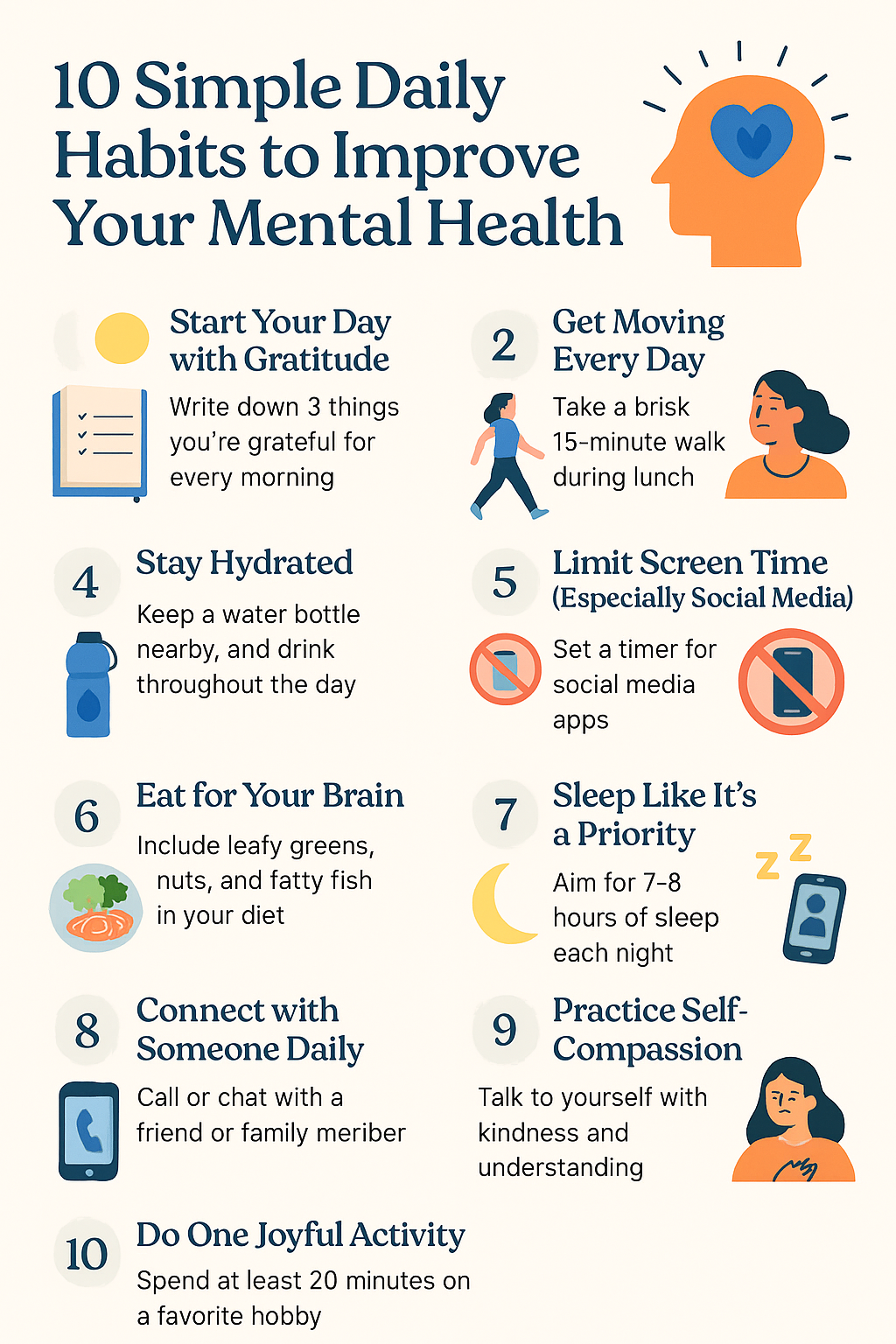10 Simple Daily Habits to Improve Your Mental Health

Introduction
Mental health is as important as physical health, yet it’s often overlooked in our busy lives. In a world where stress, anxiety, and burnout are becoming increasingly common, taking care of your mental well-being is no longer optional—it’s essential.
The good news? Improving your mental health doesn’t have to involve expensive therapies or drastic lifestyle changes. Small, consistent daily habits can make a huge difference over time.
Here are 10 simple habits you can start today to boost your mood, build resilience, and live a happier, more balanced life.
1. Start Your Day with Gratitude
Before you reach for your phone or dive into your to-do list, take a moment to express gratitude. It could be as simple as saying, “I’m thankful for a warm bed and good health.”
Why it helps:
Gratitude rewires your brain to focus on positive experiences rather than stress and negativity. Studies show it can lower stress and boost emotional well-being.
How to do it:
- Keep a small notebook and write down 3 things you’re grateful for every morning.
- Say them out loud for a stronger emotional connection.
2. Practice Mindful Breathing
Even two minutes of focused breathing can calm your nervous system and reduce anxiety.
Why it helps:
Mindful breathing activates your parasympathetic nervous system, lowering stress hormones like cortisol.
How to do it:
- Close your eyes, inhale deeply for 4 seconds, hold for 4 seconds, exhale for 6 seconds.
- Repeat for 5–10 rounds, anytime you feel overwhelmed.
3. Get Moving Every Day
You don’t have to run a marathon—just move your body. Walk, stretch, dance, or try yoga.
Why it helps:
Exercise releases endorphins, your brain’s “feel-good” chemicals, and reduces symptoms of anxiety and depression.
How to do it:
- Take a brisk 15-minute walk during lunch.
- Do simple stretches while working at your desk.
4. Stay Hydrated
We often underestimate the impact of hydration on mental health. Dehydration can cause headaches, fatigue, and mood swings.
Why it helps:
Proper hydration improves brain function, focus, and mood stability.
How to do it:
- Keep a water bottle nearby.
- Set reminders if you often forget to drink water.
5. Limit Screen Time (Especially Social Media)
Social media can be a double-edged sword—it connects us but can also trigger comparison and anxiety.
Why it helps:
Reducing screen time improves focus, sleep, and emotional well-being.
How to do it:
- Set a timer for social media apps.
- Replace morning scrolling with reading or a short walk.
6. Eat for Your Brain
Food impacts mood more than most people realize. Diets high in processed food and sugar can worsen anxiety and depression.
Why it helps:
Nutrient-rich foods like leafy greens, nuts, fatty fish, and whole grains support brain health and reduce mood swings.
How to do it:
- Include at least one leafy green and one protein source in every meal.
- Reduce caffeine and refined sugar intake.
7. Sleep Like It’s a Priority
A good night’s sleep is one of the best mental health boosters. Poor sleep can increase irritability and anxiety.
Why it helps:
Sleep allows your brain to reset, improving mood, focus, and decision-making.
How to do it:
- Aim for 7–8 hours per night.
- Keep a consistent bedtime routine—no screens at least 30 minutes before sleep.
8. Connect with Someone Daily
Human connection is crucial for emotional well-being. Even a simple conversation can reduce stress and boost happiness.
Why it helps:
Social interactions release oxytocin, the “bonding hormone,” which improves mood and reduces loneliness.
How to do it:
- Call a friend or family member daily.
- Join a community group or hobby class.
9. Practice Self-Compassion
Many of us are kinder to others than we are to ourselves. Treating yourself with compassion helps reduce stress and build self-esteem.
Why it helps:
Self-compassion improves resilience and reduces negative self-talk, which is linked to anxiety and depression.
How to do it:
- When you make a mistake, talk to yourself as you would to a loved one.
- Use affirmations like, “I’m doing my best, and that’s enough.”
10. Do One Joyful Activity
Hobbies are not a luxury—they’re a necessity for mental health.
Why it helps:
Engaging in enjoyable activities triggers dopamine, the “reward” chemical, making you feel motivated and happy.
How to do it:
- Dedicate at least 20 minutes a day to something you love (painting, music, gardening, etc.).
- Try something new to break monotony and spark creativity.
Conclusion
Improving mental health is not about one grand gesture; it’s about small daily habits. Start with one or two habits from this list and gradually add more as they become part of your routine.
Taking care of your mind is just as important as caring for your body. The sooner you prioritize your mental health, the better your quality of life will be.
FAQs
1. How long does it take to see results from these habits?
Most people start noticing improvements in mood and energy within a few days to a couple of weeks of consistent practice.
2. Can these habits replace professional mental health care?
No. While these habits support mental well-being, they are not a substitute for professional therapy or medication when needed.
3. What if I don’t have time for all 10 habits?
Start small. Even one or two habits done consistently can significantly improve mental health.
4. Are these habits suitable for people with anxiety or depression?
Yes, but they should complement, not replace, professional help. Consult your therapist before making lifestyle changes.
5. How can I stay consistent with these habits?
Use reminders, set small goals, and celebrate progress. Pair habits with existing routines, like expressing gratitude while brushing your teeth.
Call to Action:
Start with just one habit today. Which one will you try first? Share your thoughts and experiences in the comments below.
